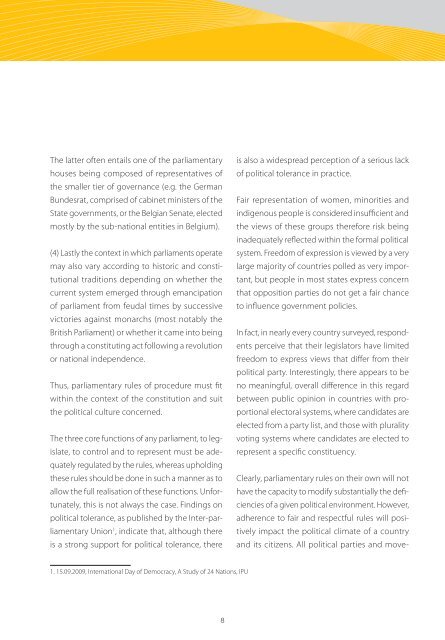Parliamentary Rules of Procedure - European Parliament - Europa
Parliamentary Rules of Procedure - European Parliament - Europa
Parliamentary Rules of Procedure - European Parliament - Europa
You also want an ePaper? Increase the reach of your titles
YUMPU automatically turns print PDFs into web optimized ePapers that Google loves.
The latter <strong>of</strong>ten entails one <strong>of</strong> the parliamentary<br />
houses being composed <strong>of</strong> representatives <strong>of</strong><br />
the smaller tier <strong>of</strong> governance (e.g. the German<br />
Bundesrat, comprised <strong>of</strong> cabinet ministers <strong>of</strong> the<br />
state governments, or the Belgian senate, elected<br />
mostly by the sub-national entities in Belgium).<br />
(4) Lastly the context in which parliaments operate<br />
may also vary according to historic and constitutional<br />
traditions depending on whether the<br />
current system emerged through emancipation<br />
<strong>of</strong> parliament from feudal times by successive<br />
victories against monarchs (most notably the<br />
British <strong>Parliament</strong>) or whether it came into being<br />
through a constituting act following a revolution<br />
or national independence.<br />
Thus, parliamentary rules <strong>of</strong> procedure must fit<br />
within the context <strong>of</strong> the constitution and suit<br />
the political culture concerned.<br />
The three core functions <strong>of</strong> any parliament, to legislate,<br />
to control and to represent must be adequately<br />
regulated by the rules, whereas upholding<br />
these rules should be done in such a manner as to<br />
allow the full realisation <strong>of</strong> these functions. Unfortunately,<br />
this is not always the case. Findings on<br />
political tolerance, as published by the inter-parliamentary<br />
Union1 , indicate that, although there<br />
is a strong support for political tolerance, there<br />
1. 15.09.2009, international Day <strong>of</strong> Democracy, a study <strong>of</strong> 24 nations, iPU<br />
8<br />
is also a widespread perception <strong>of</strong> a serious lack<br />
<strong>of</strong> political tolerance in practice.<br />
Fair representation <strong>of</strong> women, minorities and<br />
indigenous people is considered insufficient and<br />
the views <strong>of</strong> these groups therefore risk being<br />
inadequately reflected within the formal political<br />
system. Freedom <strong>of</strong> expression is viewed by a very<br />
large majority <strong>of</strong> countries polled as very important,<br />
but people in most states express concern<br />
that opposition parties do not get a fair chance<br />
to influence government policies.<br />
in fact, in nearly every country surveyed, respondents<br />
perceive that their legislators have limited<br />
freedom to express views that differ from their<br />
political party. interestingly, there appears to be<br />
no meaningful, overall difference in this regard<br />
between public opinion in countries with proportional<br />
electoral systems, where candidates are<br />
elected from a party list, and those with plurality<br />
voting systems where candidates are elected to<br />
represent a specific constituency.<br />
clearly, parliamentary rules on their own will not<br />
have the capacity to modify substantially the deficiencies<br />
<strong>of</strong> a given political environment. However,<br />
adherence to fair and respectful rules will positively<br />
impact the political climate <strong>of</strong> a country<br />
and its citizens. all political parties and move-

















